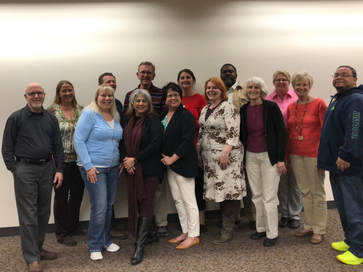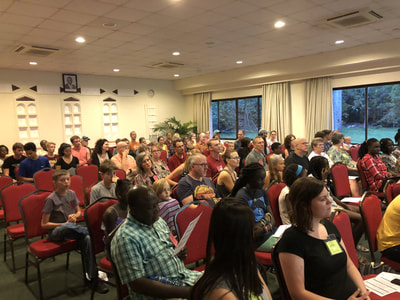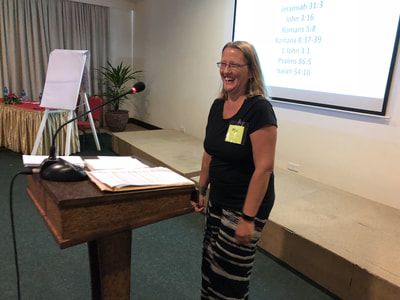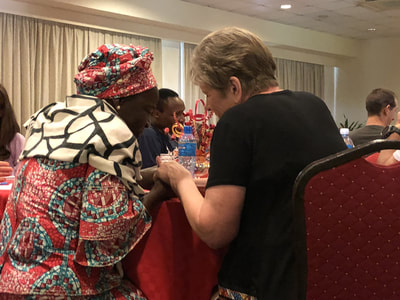|
Peace be with you and may God the Father and the Lord Jesus Christ give you love with faithfulness. May God's grace be eternally upon all who love our Lord Jesus Christ. A highlight of this month was serving as a pastoral care person during the Global Outreach Retreat at Diani Beach in Kenya. During the retreat, I had an opportunity to speak on Stress and Burnout and had many one on one meetings with missionaries. I thought I would share some of the thoughts I shared with the missionaries during my talk. Ministry and missions can be demanding and even grueling. There seems to be a wear and tear on missionaries, and this stress is multiplied if we work with those who have undergone extreme or traumatic situations. The Bible appears to recognize the strain on those who seek to help others. In 2nd Thessalonians 3:13, Paul encourages believers, saying, “But as for you, brethren, do not grow weary of doing good.” He makes a similar statement in Galatians 6:9, where he says, “Let us not lose heart in doing good, for in due time we will reap if we do not grow weary.” Paul acknowledges that it’s possible for any believer to run low on energy, to become fatigued, or even exhausted. Elijah, the great Old Testament prophet, is an excellent example of exhaustion in ministry. First Kings chapter 18 and 19 provides an account of a man of God experiencing discouragement and fatigue. Elijah accomplished a great victory in the name of the Lord. He had a front row seat to an incredible display of God’s holiness, His power, and His provision. A single prophet wins the contest against hundreds of others. I would assume that Elijah would be ecstatic after this victory and that he would long bask in the afterglow of this amazing experience. However, after the great religious triumph, Elijah experienced an emotional and physical crash. He was afraid, discouraged, exhausted, and even suicidal. This great man of God underwent a period of extreme difficulty in the midst of following and serving God. This passage clearly demonstrates that those in ministry can experience times of personal struggle, doubt, and exhaustion. What can we do then to reduce the likelihood of experiencing unproductive fatigue or exhaustion, and what can be done to avoid burnout? If a missionary does experience burnout, exhaustion, or secondary trauma stress, what should he or she do to cope most effectively? To answer these questions, consider God’s care for Elijah, when he hid in the wilderness, exhausted and alone. Following his triumphant encounter with the priests of Baal, Elijah flees to the wilderness, sits down under a tree, and asks God to end his life. God’s response provides insight into His concern for and care of those who minister to others in His name. First, God allows Elijah to rest (1 Kings 19:5). Whether from the overall strains of ministry, the pressure of the contest between prophets, or the energy expended in fleeing from Jezebel, Elijah was exhausted. Next, God feeds His prophet. An angel awakens Elijah and instructs him to eat: “Then he looked and behold, there was at his head a bread cake baked on hot stones, and a jar of water. So, he ate and drank and lay down again” (1 Kings 19:6). God provided nourishment and rest for Elijah, not just once, but twice. After Elijah rests again, God tells him to eat yet one more time (verse 7 and 8). After Elijah is rested and fed, God takes him on a journey, far away from others, where the prophet meets alone with God. In addition to providing for Elijah’s physical needs, God then addressed his spiritual concerns. Elijah voices his frustration to God, including how the wicked people were behaving, and his sense of futility in ministry. On two occasions (verse 10 and 14), Elijah complains that he’s the only one fighting Gods battles. In this, we see his sense of isolation. God’s response to Elijah is noteworthy. He reveals Himself to Elijah through the quietness of a gentle breeze. It appears that God pulls Elijah away from the active noise of ministry to enable the prophet to hear God’s voice. God then reassures Elijah that he is not alone; seven thousand others exist who have not prostituted themselves to foreign gods (1 Kings 19:18). God gives Elijah instructions for returning to ministry, where once again we see this strong man of God fighting battles. In this encounter between God and Elijah, God did not scold, punish, or reject Elijah for his discouragement and exhaustion. He provided for Elijah physically, emotionally, and spiritually. He allowed Elijah to retreat from ministry and then prepared him to reenter. God helped Elijah rejuvenate to continue doing the work to which God called him. God’s care of and provision for Elijah is instructive to the rest of us serving Him. Please pray for these missionaries as they have re-entered their fields of service, after a time of rest and retreat. Pray that they employ self-care strategies to stay healthy and thriving on the field.  Advanced Equipping Participants in Wheaton, IL Advanced Equipping Participants in Wheaton, IL Prayer Requests:
Ministry Care is a 501c3 organization, therefore, your donation will be tax deductible. You may donate one of 2 ways. You can make checks payable to “Ministry Care” and send them to:
Ministry Care 14934 Pacer Ct. Carmel, IN 46032 Or you can make an online donation, using Givelify, on our website at www.ministrycareinternational.org or click the button below If you have any questions feel free to email us as ministrycareinternational@gmail.com Thank you so much! And may God bless you richly with His presence!
0 Comments
Leave a Reply. |
AuthorMisty Bodkins has a Master's degree in clinical psychology. She has worked both stateside and internationally doing counseling, training, teaching, and research. Her passion is working with people who are in crisis. Archives
March 2024
Categories |




 RSS Feed
RSS Feed
